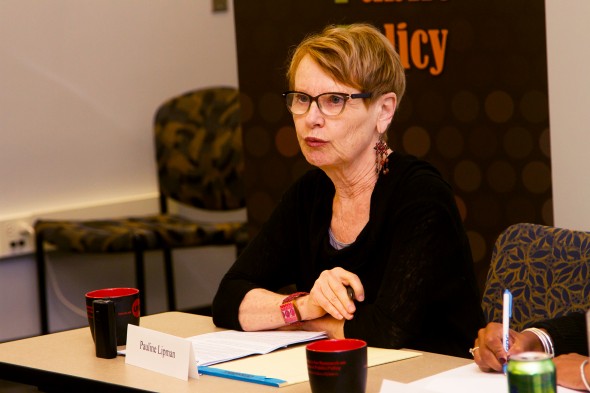Policy 101

Faculty member Pauline Lipman speaks during a panel on using research to inform policy changes. (Photo: Vibhu S. Rangavasan)
Pauline Lipman would rather be protesting than writing a policy brief, she said at a recent workshop in Daley Library, but the professor of educational policy is taking on the role of an activist in another way.
She and her colleagues at the Collaborative for Equity and Justice in Education (CEJE) work with community members to produce and share knowledge that shifts the dominant policy discourse to support community solutions and justice in the education system. She uses campus resources and her own expertise to help others.
“With the research we do, communities are contesting the state. So they’re pushing back against policies — policies from the state — and then they’re also proposing policies, policies that come from the ground, from the experiences of parents and communities,” she said.
The Institute for Research on Race and Public Policy (IRRPP) brought Lipman and three other faculty members together for a panel discussion Oct. 4, the first installment of the Policy 101 Workshop Series. The series, created collaboratively by IRRPP, the Institute for Policy and Civic Engagement and the Institute of Government and Public Affairs, helps increase the impact and visibility of research being done by faculty and scholars at UIC.
“A lot of the skill sets necessary to get our work out there are these things that we learn along the way,” said Amanda Lewis, the director of IRRPP.
Other panelists included Beth Richie, professor of African American studies and criminology, law and justice; Jennifer Herbert-Beirne, professor in the school of public health; and Phoenix Matthews, professor in health systems science in the College of Nursing.
The event explored how researchers can develop and create meaningful community partnerships. Panelists each talked about their research and the communities they have worked with. Faculty shared the challenges they’ve faced, successes they have had and how they have contributed to the knowledge and understanding of their subject area.
Community health scientist Herbert-Beirne emphasized the importance of making research more community-driven to push for social change, and to avoid “advancing ourselves, but doing nothing for the community,” she said.
Matthews noted that IRRPP staff helped to inform her about how she could be more involved with changing policy.
“It had never occurred to me,” said Matthews, who works with the Chicago Restroom Access Project, an initiative concerned with making accessible public bathrooms. “But after being involved in the work…it’s really been a powerful tool for social change. We’re very fortunate to have this institute on campus.”
The next workshop, scheduled for Nov. 10, will focus on increasing researcher’s participation in public policy conversations.
